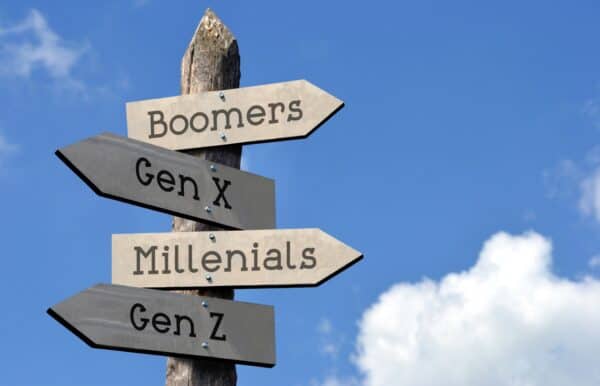The baby boomer generation, born after World War II, is often characterized by its distinct cultural markers and societal influences.
While the baby boomer generation is typically associated with those born between 1946 and 1964, many of us were born during this time but didn’t fully identify with the boomer label.
In this article, I will explore the reasons behind this “in-between” feeling, the impact of critical events during our formative years, and why many of us relate more to Generation X.

You Were Born During the Baby Boom
If you want to know whether you were born during the baby boom, here are some clear indications:
High Birth Rates and Economic Boom after WWII
After WWII, there was a significant increase in births and a strong economy. The war’s end brought hope and a desire for a better future. The G. I. Bill helped soldiers get education and homes and start businesses, boosting the economy. Families reunited, leading to a big baby boom that changed the country’s population and culture.
Dates of the Baby Boomer Generation
The Baby Boomer generation includes people born from the mid-1940s to the early 1960s. This period covers the peak years of a significant increase in births after the war, lasting about two decades.
A study by the Pew Research Center shows that Baby Boomers form one of the largest generational groups in U.S. history. Although exact dates may differ slightly, the impact of the Baby Boom era on American society and culture remains significant.
Your 1950s Birth Year
As someone born in the 1950s, you entered the world with unparalleled prosperity and opportunity. Your birth coincided with the peak of the baby boom, a time when families were expanding, suburbs were burgeoning, and the American Dream seemed within reach for many.
Against the backdrop of this economic boom, you came into existence, poised to witness and contribute to the transformative changes that would shape the decades to come.
Your birth year is a pivotal moment in the broader narrative of the baby boomer generation, reflecting the hopes, dreams, and aspirations of an entire cohort of individuals born during this remarkable period in history.
So Why Don’t You Identify With Boomers?

Even if you were born during the baby boom, you might not fully identify with the boomer generation because your life experiences and viewpoints could differ significantly. Early boomers, born just after World War II, grew up in the stable, prosperous 1950s, with memories of suburban life and iconic figures like Elvis Presley.
Conversely, late boomers came of age during the turbulent 1960s and 70s, marked by civil rights movements and opposition to the Vietnam War. Their formative years were influenced by rebellious music and questioning authority.
Despite technically being a boomer, you might feel more aligned with Generation X, who grew up amidst economic uncertainty and technological advancements like MTV and personal computers.
Gen Xers are known for their independence and skepticism toward traditional institutions, traits that might resonate more with your values and experiences. You might connect more with Gen X than with your fellow boomers.
Coming of Age in the 60s and 70s
Events During Your Formative Teen Years
The 1960s and 70s were decades marked by profound social, cultural, and political change, and as someone who came of age during this time, your formative years were undoubtedly shaped by the events of the era.
From the civil rights movement to the sexual revolution, these decades were defined by activism, rebellion, and questioning authority.
As a teenager in the 60s and 70s, you witnessed firsthand the power of collective action as marginalized communities fought for equality and justice.
The Civil Rights Act of 1964 and the Voting Rights Act of 1965 were watershed moments in American history, challenging institutionalized racism and paving the way for greater inclusion and diversity.
Simultaneously, the 1970s saw the rise of the feminist movement, as women across the country demanded equal rights and opportunities.
The legalization of abortion with the Roe v. Wade Supreme Court decision in 1973 was a landmark victory for women’s reproductive rights, sparking fierce debates that continue to shape political discourse today.
Amidst these movements for progress, the collective memory of the Great Depression lingered, influencing attitudes toward economic policy and social welfare initiatives and ensuring its relevance in shaping the cultural landscape of the time.
Differences in Upbringing from Older Boomers
While older people of the baby boomer generation may have experienced a more traditional upbringing characterized by post-war prosperity and conformity, younger boomers forged their path, challenging societal norms and embracing a spirit of individualism and self-expression.
This generational shift was evident in teenage life, from fashion and music to attitudes toward authority and social issues.
Unlike their parents’ generation, who may have adhered to the values of the “greatest generation,” younger boomers were more likely to question authority, challenge established institutions, and advocate for social change.
The teenage years of the 60s and 70s were a time of profound transformation and upheaval as young people grappled with the complexities of a changing world and sought to define their place within it.
Through activism, rebellion, and cultural innovation, teenagers of this era left an indelible mark on history, shaping the course of social and political movements for generations to come.
Impact of Key Events like the Vietnam War and Watergate

Central to the teenage experience of this era were the Vietnam War and the Watergate scandal. The Vietnam War, a divisive conflict that lasted from the early 1960s to the mid-1970s, deeply affected young people across the United States.
Many teenagers faced the prospect of being drafted into a war they did not understand or support, leading to widespread protests and demonstrations against U.S. involvement.
This opposition to the war became a defining feature of the youth counterculture movement, as young adults voiced their dissent and demanded an end to the conflict.
Similarly, the Watergate scandal, which unfolded in the early 1970s, rocked the nation and further eroded trust in government institutions.
The revelations of political corruption and abuse of power surrounding President Richard Nixon’s administration shocked the public and underscored the importance of transparency and accountability in democratic governance.
For teenagers coming of age during this time, Watergate served as a sobering lesson in the fragility of democracy and the need for vigilant oversight of those in positions of authority.
These events left a lasting impact on the collective consciousness of the baby boom generation, shaping their perspectives on government, society, and the world at large for a long time.
Feeling More Like Gen X
As a baby boomer, you might resonate more with Generation X than with older members of your cohort. Here’s why:
Gen X Marks in Work Ethics and Views
Generation X is often associated with a distinct work ethic characterized by adaptability, independence, and a willingness to challenge traditional norms.
As someone born in the later years of the baby boomer generation, you may find that your work ethic and views align more closely with those of Generation X., Unlike older boomers who may have prioritized stability and traditional career paths.
Similarly, your approach to work may reflect these characteristics as you seek out opportunities for innovation and growth rather than adhering to established norms.
If you embody these traits and hold more conservative views than older generations, you may align more with them regarding work ethic and values.
Moreover, your views on social and political issues may resonate more with Generation X.
While older boomers may have been influenced by the idealism of the 1960s counterculture movement, you came of age during economic uncertainty and political disillusionment. This experience likely shaped your worldview, leading to a more pragmatic and individualistic outlook.
Different Cultural Upbringing
Another factor contributing to your identification with Generation X is your cultural upbringing. Growing up during a different era than earlier baby boomers means your exposure to popular culture was unique.
At the same time, previous generations may fondly recall icons like Elvis Presley and the Beatles and the rise of television and rock ‘n’ roll; different cultural touchstones likely influenced your formative years.
The emergence of MTV, the punk rock movement, and the advent of personal computers defined your youth, shaping your tastes and preferences in music, entertainment, and technology.
These cultural differences may contribute to your sense of alignment with Generation X.
Relating Better to Gen Xers and Younger

Given these differences in cultural experiences and values, it’s natural that you may relate better to Generation Xers and even younger generations than to older boomers.
Gen X’er, with their independent streak and embrace of alternative culture, may feel like kindred spirits who share your outlook on life and work.
Additionally, your interactions with younger individuals, such as millennials, Generation Z, or Gen Z, may feel more natural as you share common ground regarding cultural references and attitudes towards technology and social change.
In essence, while your birth year categorizes you as a baby boomer, your identification with Generation X reflects the evolving nature of generational identities and the common ground shared across different age groups.
What Does This Mean?
This “in-between” feeling has led to the term “Generation Jones” to describe those born in the late 1950s and early 1960s. We are not fully baby boomers, nor are we Gen Xers.
This designation acknowledges our unique experiences and challenges and their impact on our identity and relationships.
Being “Generation Jones”
Generation Jones refers to a unique cohort of individuals caught between the baby boomers and Generation X. This term was coined to describe those born roughly between the mid-1950s and early 1960s, a group that often feels distinct from preceding and subsequent generations.
Not Fully Either Boomer or Gen X
Being part of Generation Jones means straddling the line between two primary generational cohorts without fully belonging to either.
While you may share some characteristics with baby boomers, such as experiencing the cultural shifts of the 1960s and 70s, you also resonate with the values and experiences of Generation X, particularly regarding work ethic and cultural influences.
Impact on Your Identity and Relationships
Being part of Generation Jones can significantly impact your identity and relationships. Age differences within this cohort may lead to varied perspectives and life experiences, influencing how you relate to older and younger individuals.
Additionally, navigating between two distinct generational identities may foster a sense of ambiguity or belongingness, shaping your self-perception and interactions with others.
Looking Forward

Moving forward, we need to embrace our unique position and continue to find connections with others across generations. Understanding the experiences and challenges different age groups face can foster better relationships and contribute to a more inclusive society.
Let us celebrate our role as a bridge between generations and recognize the contributions we can uniquely make.
So, if you were born in the 1950s and don’t quite feel like a boomer, know that you are not alone, embrace your identity as part of Generation Jones and continue to make a difference in the world.
